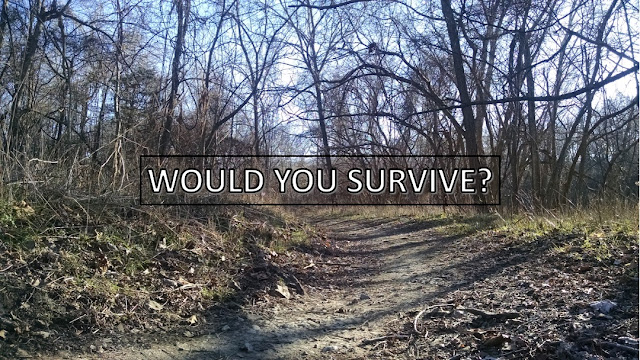WOULD YOU SURVIVE!? Living off wild edibles...
Here's the situation: America has become destabilized. Walmart only sells to regime loyalists. You need food because you are the resistance!
Alternate situation: You've been living in a van down by the river, but you've run out of government cheese. You could get a job, but you ain't about to work for the man! You need food and by gosh darn-it, you're a friggin patriot! Thomas Jefferson's blood runs through your veins!!
Alternate, alternate situation: You have a genuine interest in your environment. Okay, maybe your political views would weird out your friends, but your research is mostly scientific. You want to learn how to find food for yourself. You could go and buy a cheeseburger. You think wild persimmons are cooler.
LOOK NO FURTHER!!
Question: What foods do I need to survive?
FAT: In all seriousness, fat is actually the hardest resource to find when you're trying to eat wild foods. Most game animals lack fat, like deer, rabbits, and squirrel. Here are some sources of fat that could help get you by.
Nuts: In Missouri, the most common nuts are Hickory nuts. They are easy to identify and generally plentiful. The main problem is they show up in the fall, not the spring or summer. You could also gather wild walnuts. They yield more fruit and are easier to access, but they don't taste as good. If you're lucky, you might find wild hazelnuts. In that case, you can eat like a king. The upside of all this is if you find nuts, you'll find squirrels as well.

Beaver: Beavers have a ridiculous amount of fat on them. Their meat is edible. However, in a survival situation, you'd need to know how to use snares (you c
ould learn fairly easily) and be in a place where they have a habitat. One beaver is probably more meat and fat than one person could feasibly use. It's also not the tastiest, but hey, tasty isn't the main concern.
Some Fish: Technically, some fish, like catfish have belly fat that you could eat. Problem is, since many bodies of water are polluted today, that's where the pollutants collect. Unless you're positive that your local body of water is very clean, I wouldn't recommend this.
 |
| Squirrels are fairly easy to get food |
Fish: Panfish are the easiest to catch and most readily found. Catfish or other fish that can be taken with trot lines would be an excellent choice. In a survival situation, a fish trap would be better, but I'm pretty sure that's illegal now.
Crustaceans: Crawdads! Crawdads for days! They are abundant, easy to catch, and can be found in pretty much any place with water. If you're surviving with kiddos, they can catch them with sticks and found water bottles or other water tight trash. Or you could just hunt crawdads for fun.
Frogs and Turtles: Frogs. Need I say more? As far as turtles go, I wouldn't bother much with snapping turtles or other common types. Some, I've heard, can make you hallucinate. Weird. Soft-shell turtles are the way to go. They will bite cut fish, hot dogs, whatever the heck you want to throw at them. As long as you have a fairly sharp knife, they are easy to clean and have plenty of meat on them.
 |
| Soft Shelled Turtle |
SUGARS AND PLANTS: Theoretically, you could go and buy the last bag of sugar from Walmart. You could also learn to identify berries. Here are some easy fruits to identify.
 |
| Paw-Paw |
Wild Plums, Persimmons, and Mulberries: I'll do a full blog someday on wild fruit. Berries are great because they ripen in the summer instead of late fall like paw-paws, persimmons, and mulberries. If you're lucky, you might be able to find apple trees as well.
Cattails: Cattail roots can be eaten as a starch and have important nutrients. They are found along watersides and wetlands.
Willows: Willow bark can be used for pain reliever, fever reducer, and other medicinal uses. I intend to do more research on this. The branches can also be used to make super cute baskets to carry your berries and mushrooms in.
Mushrooms: BE CAREFUL!! Mushrooms can be a great food source, but if you don't know what you're doing, you could poison yourself. If you're a fledgling weekend warrior who finds yourself in a survival situation, just avoid mushrooms if you haven't taken the time to research them. If you have the knowledge, do it!
WOULD IT WORK?
Honestly, probably not. With great skill (that I don't possess), a person in modern times might be able to eke out survival on wild plants alone. There is a very good reason that humanity has moved from a hunter gatherer society to depending on agriculture. Wild foods are not reliable and are often too far scattered to be used by a person without modern modes of transportation.
Could you keep yourself from dying? Sure! You could probably sustain your life for a limited time. The Wooded Beardsman has a great Youtube series about living off wild foods. It's called the Wilderness Living Challenge. If you are interested in this topic, you should watch it.
If you really wanted to survive, "off the grid," you'd need to learn how to cultivate plants, not just identify and forage for them. BUT, that doesn't mean you shouldn't try. If you know your environment, you have a measure of power and independence that most people don't have. It's always a ton of fun. So get out there, try not to get into weird conspiracy theories, and enjoy the great outdoors!
 |
| CRAWDAD ATTACK!! |




Comments
Post a Comment